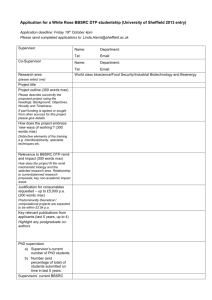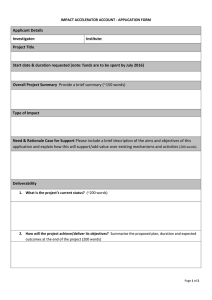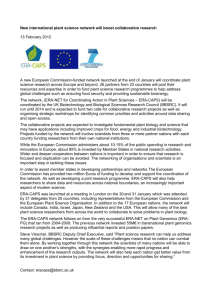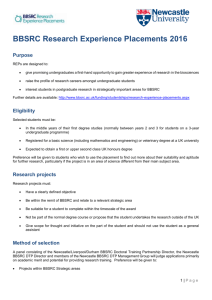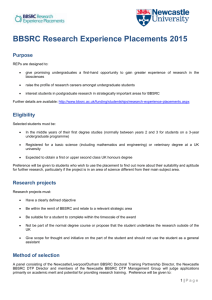Collaborative Training Partnerships Guidance Notes
advertisement
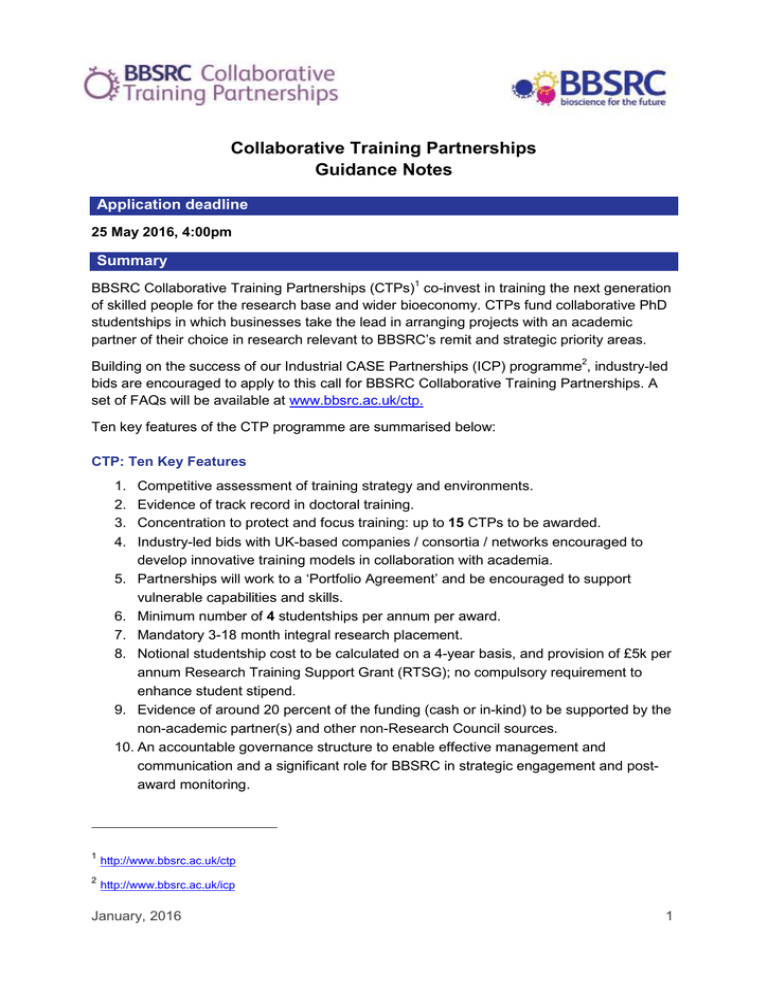
Collaborative Training Partnerships Guidance Notes Application deadline 25 May 2016, 4:00pm Summary BBSRC Collaborative Training Partnerships (CTPs)1 co-invest in training the next generation of skilled people for the research base and wider bioeconomy. CTPs fund collaborative PhD studentships in which businesses take the lead in arranging projects with an academic partner of their choice in research relevant to BBSRC’s remit and strategic priority areas. Building on the success of our Industrial CASE Partnerships (ICP) programme2, industry-led bids are encouraged to apply to this call for BBSRC Collaborative Training Partnerships. A set of FAQs will be available at www.bbsrc.ac.uk/ctp. Ten key features of the CTP programme are summarised below: CTP: Ten Key Features 1. 2. 3. 4. Competitive assessment of training strategy and environments. Evidence of track record in doctoral training. Concentration to protect and focus training: up to 15 CTPs to be awarded. Industry-led bids with UK-based companies / consortia / networks encouraged to develop innovative training models in collaboration with academia. 5. Partnerships will work to a ‘Portfolio Agreement’ and be encouraged to support vulnerable capabilities and skills. 6. Minimum number of 4 studentships per annum per award. 7. Mandatory 3-18 month integral research placement. 8. Notional studentship cost to be calculated on a 4-year basis, and provision of £5k per annum Research Training Support Grant (RTSG); no compulsory requirement to enhance student stipend. 9. Evidence of around 20 percent of the funding (cash or in-kind) to be supported by the non-academic partner(s) and other non-Research Council sources. 10. An accountable governance structure to enable effective management and communication and a significant role for BBSRC in strategic engagement and postaward monitoring. 1 2 http://www.bbsrc.ac.uk/ctp http://www.bbsrc.ac.uk/icp January, 2016 1 Background The Collaborative Training Partnerships (CTP) scheme is the successor to the Industrial CASE Partnerships (ICP) scheme and is a key mechanism by which BBSRC funds collaborative (sometimes referred to as CASE) studentships. BBSRC CTPs enable outstanding students to undertake doctoral-level research within the context of a mutuallybeneficial industry-academia collaborative partnership, with access to training, facilities and expertise not available in an academic setting alone. How are current awards made? CASE studentships are currently awarded by BBSRC in a number of ways3, either via CTPs or our Doctoral Training Partnerships (DTP)4. In 2013, an independent Evaluation of BBSRC’s CASE Schemes5 recommended broadening participation and ensuring a balance across the industrial sectors covered by BBSRC’s remit. Good practice in collaborative doctoral training In recognising the importance of working closely with industry to achieve impact and the ongoing need for researchers to develop appropriate skills and understanding in a collaborative context, BBSRC’s Industrial Training Strategic Framework6 was published in March 2014. The Framework defines a number of key principles which underpin BBSRC’s current and future investment strategies, ensuring that support is targeted effectively at all career levels: Industrial training should encourage and drive culture change in industry and academia through trained people. Industrial training should complement other forms of training that we support. Industrial training should recognise the value of interventions at all career stages. Industrial training should be responsive to the needs of different-sized companies and industrial sectors, as well as to the needs of individuals at different career stages. Industrial training should be delivered through multi-lateral partnerships with academia and industry. Our approach to industrial training should recognise the importance of ensuring communication with key stakeholders for maximum dissemination. The outcomes and impacts arising from industrial training should be captured in order to inform good practice. The value of cross-partnership cooperation and collaboration was captured when ICP and DTP leads met in February 2015 and developed a framework of good practice for managing training partnerships7. 3 4 5 6 7 http://www.bbsrc.ac.uk/skills/investing-doctoral-training/case-studentships/ http://www.bbsrc.ac.uk/dtp http://www.bbsrc.ac.uk/about/policies/reviews/funded-science/1306-industrial-case-evaluation http://www.bbsrc.ac.uk/about/policies/policy-foi/policy/industrial-training-strategic-framework http://www.bbsrc.ac.uk/skills/investing-doctoral-training/good-practice-in-doctoral-training/ January, 2016 2 The Research Councils place a high degree of importance on training and career development, and CTP applicants should therefore be mindful of the RCUK Statement of Expectations for Postgraduate Training8. Defining an excellent collaborative studentship High-quality project: A challenging, feasible and realistically achievable doctoral project that stimulates excellent research. Through a truly collaborative approach, it provides tangible benefits to all partners. High-quality training environment: Through access to distinctive but complementary environments, partners provide a stimulating framework for research training in the proposed field. Joint supervision gives a unique and broadening perspective on the impact of collaborative research. High-quality student experience: An enriched integrated training experience allows the student to acquire novel skills and expertise. The student gains a wider understanding of how their research may have an impact in a wider context that will enhance their future employability. Number of awards and funding available Up to 15 Collaborative Training Partnerships will be awarded. The total funding available will support in the region of 75 four-year studentships per annum for three intakes (from October 2017-19, commencing in the 2017/18, 2018/19 and 2019/20 academic years), and will be awarded in the form of individual profiled Training Grants. The normal flexibility of Research Council Training Grants9 will apply, enabling institutions to part-fund studentships from other sources. The funding for each four-year studentship will include £5k per annum research training support costs, as well as student stipend and fees at standard Research Council levels 10. Lead applicants should indicate the maximum number of studentships the company / consortia / network can support per year although the number awarded to each partner may be fewer. We expect the CTP to be developed from the outset in close collaboration between academic and non-academic partner(s) and for around 20 percent of the funding to be supported by non-academic partner(s) and other sources (except other Research Council sources) or the Research Organisation (RO). We recognise that the contribution from the non-academic partner may be a mix of cash and in-kind contributions. Key question to consider when completing the application: How will BBSRC funding be used to leverage support from elsewhere? 8 9 http://www.rcuk.ac.uk/documents/skills/statementofexpectation-pdf/ http://www.bbsrc.ac.uk/web/FILES/Guidelines/training-grant-faqs.pdf 10 http://www.rcuk.ac.uk/skills/postgrad January, 2016 3 Eligibility - is CTP for you? Managing a BBSRC CTP is a significant undertaking and each potential applicant should consider carefully the benefits versus obligations. It is possible for those non-academic organisations not in receipt of CTP funding to still be awarded individual CASE studentships via DTPs. BBSRC is keen to see the training of all our students in foci of collaborative research excellence which promote and facilitate multi-disciplinary working and expose the students to a wide range of expertise. In contrast to BBSRC DTPs, CTPs should be led by industry - having a UK research and/or manufacturing base - and therefore the lead applicant should not be eligible for BBSRC grant funding. Whilst we anticipate that most CTPs will be led by a single company, where relevant we encourage multi-partner bids involving two or more companies, assuming collaborative agreements are in place. In some instances, it may be appropriate for a defined network to be awarded an allocation of studentships to distribute (either competitively or strategically) on behalf of a consortium of companies, providing that details of how the resultant cohort will be managed are acceptable. Through this multi-faceted approach, BBSRC intends to promote integrated strategies for research and training which meet our strategic priorities, address vulnerable capabilities and skills, and foster inter-disciplinarity. A non-academic partner organisation will normally only be involved in one CTP proposal and may only submit one proposal as lead applicant. Applicants are strongly encouraged to contact BBSRC for advice if they are considering being part of more than one Partnership. Details of any degree-awarding ROs (i.e. universities) aligned with the Partnership should be included in the application. It is possible for eligible ROs to be included as ‘Associate Partners’ on a CTP application, providing the Partnership can demonstrate that there is significant added value/benefit to the inclusion of specified ‘Associate Partners’ within the Partnership. Should a CTP application be successful, it is imperative for the CTP nonacademic lead to ensure that every academic partner is eligible11 and has satisfactory submission rates (minimum 70% across all academic years). In addition, it is the responsibility of the partners involved in recruitment of students to confirm individual student eligibility, and to have an open, transparent and merit-based recruitment process, cognoscent of equality and inclusion considerations. Further information can being found on the BBSRC’s studentship website12. Key question to consider when completing the application: With whom will you partner to achieve critical mass? Cohort management Current good practice advocates that doctoral training is most effective when delivered in viable cohorts and each CTP should aim to support around ten students (BBSRC-funded and other) per annum in order to build critical mass and enable students to study together. 11 12 http://www.rcuk.ac.uk/funding/eligibilityforrcs http://www.bbsrc.ac.uk/funding/studentships January, 2016 4 Studying as part of a cohort has been shown to be highly beneficial in terms of the support students receive from one another and also the training opportunities available to them. Applicants are expected to outline their strategy for enabling optimal student interaction and developing a cohort identity across all partners. Applicants requesting fewer than ten studentships per annum not belonging to a defined cohort will need to provide compelling justification of lower numbers and explain how students will be integrated into a more comprehensive cohort over time. It may be possible for an allowance to be made if the proposed focus of the CTP is in an area of recognised strategic importance or in need of building national capability. Key question to consider when completing the application: How will your CTP develop a viable cohort? ‘Portfolio Agreement’- strategic alignment In this call for CTPs, BBSRC is seeking to invest in a portfolio of Partnerships that provides world-class PhD training and a balance between the ‘general advancement of knowledge’ (world class underpinning bioscience) and its strategic priority areas. BBSRC seeks to invest in training across its portfolio akin to our DTPs, ideally in the proportions shown in Figure 1. FS 30% WCUB 40% BFH 10% IBBE 20% Figure 1. Target allocation of CTP studentships by BBSRC strategic research area (FS: Agriculture and food security; IBBE: Industrial biotechnology and bioenergy; BFH: Bioscience for health; WCUB: World class underpinning bioscience) There is no expectation that an individual CTP should seek to cover the full range of BBSRC’s priorities. Prospective partners are advised to play to their strengths, but where they are seeking to use the CTP to grow capacity in a research area, they must justify their rationale. With advice from the CTP Assessment Panel, and prior to acceptance of any award, BBSRC reserves the right to revise individual Portfolio Agreements so as to collectively achieve optimal remit coverage. As part of their proposal, applicants should explain how they will ensure that the PhD projects fall wholly within BBSRC’s remit, or how they will use the Training Grant flexibility to obtain joint-funding with other Research Councils or sponsors as necessary. In addition to CTPs collectively supporting a balanced portfolio, individual Partnerships are encouraged to describe how they will identify and support research and training to address vulnerable capabilities and skills within the context of their broader research strategy. January, 2016 5 To complement this world-class research training, Partnerships are expected to describe how they intend to support training in the: Core bioscience skills (mathematics, bioinformatics and statistics, e.g. through the SysMIC programme13 or equivalent). Generic and professional skills14. Key question to consider when completing the application: How will you play to your strengths to help BBSRC achieve the ideal overarching strategic alignment? Obligations - training and financial The CTP Director We expect the CTP to have an accountable governance structure which enables effective engagement and communication with all levels including supervisors and students. We also expect to see high-level engagement from senior management to ensure the CTP links with organisational governance and advice streams, and to enable the CTP to access wider resources where relevant. The named Director on the CTP proposal - alongside an Operational / Administrative Lead if necessary - will be interviewed as part of the peer review process. We expect that the Director will remain in place for the duration of the CTP; if they step down, BBSRC will need to be consulted on their replacement. Applicants are required to explain the suitability and commitment of the Director and the senior management team. The Placement All CTP CASE students will be based at an eligible RO, but must spend part of their time with the industrial partner. The placement period should be a minimum of 3 months to a maximum of 18 months where the placement must be directly related to the research project area, developed in collaboration between academic and non-academic partners with input from the student. If appropriate, the placement duration can be accrued through a number of shorter placements. Placements can be based overseas. All costs (e.g. travel, accommodation, lab costs) associated with the placement must be met by the non-academic partner. Widening participation We want to ensure that we support the most talented students whatever their background and regardless of where they undertook their first degree. To ensure that this happens we require: selection processes to be open and transparent and enable the potential of the candidate to be assessed whether they are applying on a full or part-time basis, whether they have prior research training or not, and regardless of their demographic. all studentships to be available on a full or part-time basis and the availability of parttime awards must be clearly set out when advertising funding opportunities. 13 14 http://sysmic.ac.uk/home.html http://www.vitae.ac.uk/researchers/428241/Researcher-Development-Framework.html January, 2016 6 opportunities for BBSRC-funded studentships to be actively publicised both within and beyond the host ROs. We expect applicants to think imaginatively and address in their proposals how they will contribute to the widening participation agenda and promote postgraduate research to a diverse base of talented graduate students across the UK. Financial commitment and accountability It is important for BBSRC to form partnerships with organisations which have a clear and long-term strategy for developing their bioscience research, and where this is backed up by recent and on-going investment. Therefore, in assessing proposals to become Collaborative Training Partnerships, BBSRC will ask its Assessment Panel to take account of the investment that organisations are committed to making in their bioscience research and training relevant to BBSRC remit. This may be through the co-funding of additional studentships, a commitment to enhanced training grants or improved access to research facilities. As a measure of interest and commitment, the CTP must make an appropriate financial contribution to the training of the student, with an expectation of around 20 percent of the funding (cash or in-kind) to be supported by non-academic partner(s) and other sources (except other Research Council sources) or the RO. Standard doctoral stipend levels and indicative fees are set annually by RCUK15. Financial contributions to the academic partner and/or student may vary and should have been agreed in advance by all partners at the time of application. It is required that the CTP partner makes a financial contribution to the training of the student, including all additional expenses, such as the cost of travel and accommodation, incurred by the student as a direct result of attendance at the premises of the non-academic organisation during placement or otherwise. Collaborative Agreements At the time of application, collaborative agreements should be in place regarding management of the student's work, and agreements concerning any Intellectual Property that may arise as a result. This collaboration should be effectively managed, to maximise the benefits for all parties concerned. Whilst new intellectual property may arise from some studentships, it should not be expected in most cases. Monitoring arrangements and partnership with BBSRC In submitting a proposal to become a BBSRC Collaborative Training Partnership, the partners involved thereby agree to comply with monitoring arrangements established by BBSRC, and to work in partnership with BBSRC to support its priorities for PhD training. CTPs will be asked to report annually on their provision of training and this will be reviewed by BBSRC and its nominees in connection with the Portfolio Agreement between BBSRC and the partners. 15 http://www.rcuk.ac.uk/skills/postgrad January, 2016 7 BBSRC wishes to continue a high level of engagement with successful Partnerships in order to support partners in their postgraduate work. This will include the partners being able to seek advice on issues which may emerge in their management of the CTP, as well as enable BBSRC to provide guidance on emerging skills issues and policy developments. The monitoring and engagement activities are therefore likely to include: Annual reports to BBSRC Hosting an annual Partnership visit by BBSRC staff and its nominees Ensuring the provision of accurate and timely information on student project (usually submitted by the RO) to BBSRC via Je-S Student Details Good practice sharing events Assessment The assessment of proposals to become BBSRC Collaborative Training Partnerships, which will include an interview with the management team of the proposed Partnerships, will be carried out in July 2016 and announcements regarding the allocation of funding will be made before October 2016. The interview date will be confirmed on the BBSRC website16 in early 2016 but is expected to be 13-14 July 2016. In making its decisions, the Assessment Panel will assess the information provided by applicants as part of their CTP proposal. The Panel will also draw on information provided by BBSRC on the current training grant portfolio where an analysis of the studentship project details which have been returned to BBSRC through the Je-S Student Details may be presented to the Assessment Panel. Assessment criteria BBSRC Collaborative Training Partnerships are assessed competitively against three main criteria, summarised below: Excellence of research and alignment of PhD training to BBSRC’s remit and priority research areas Excellence of the PhD training programme and training environment across the organisations involved in the Partnership Quality of management of the collaborative training programme, supervision of the students, and governance of the Partnership BBSRC will be advising its Assessment Panel to award a balanced portfolio of Partnerships which can provide excellence of training and an overall balance between ‘general advancement of knowledge’ (through the support of world-class underpinning bioscience) and its priority research areas. 16 http://www.bbsrc.ac.uk/ctp January, 2016 8 How to apply Deadline 25 May 2016 4:00pm Town Hall meeting A Town Hall meeting to discuss the detailed requirements of the call will be held on 4 March 2016 at the Wellcome Collection in London. Up to two members from each putative partnership are eligible to attend and must register by emailing CTP@bbsrc.ac.uk. Full details of the event will then be provided. Institutions are strongly encouraged to read in full the background information provided in order to better address the requirements of the call. A set of attachments which should be completed for BBSRC Collaborative Training Partnership applications and uploaded with the Training Grant application are available on the BBSRC website, including: CTP - Cover Letter and Mission Statement (“Proposal Cover Letter”) CTP - Portfolio Agreement Attachment (“Case for Support”) CTP - Performance Indicators (“Studentship Proposal Performance Indicators”) CTP - List of Collaborative Studentships (“Other Attachment”) A set of FAQs accompanying this call will be available on the BBSRC website17. These will be updated to provide answers to frequently asked questions. Proposals must be submitted using the Joint Electronic Submission (Je-S) system. The call will be available on Je-S from 8 February 2016. Please note, as an application progresses through Je-S, the headings on the form may state “Training Grants” since the generic form is used for other programmes. Please follow the instructions carefully and select the CTP form at the point stated to ensure that the application is processed correctly within the CTP programme. Industrial organisations must ensure that they are registered on Je-S as an organisation in order to submit applications. Being a “listed” organisation on Je-S is not sufficient to allow the submission of applications, where each organisation will need to go through a formal registration process to become “registered” on Je-S. To register, applicants should contact the Je-S Help team at Je-SHelp@rcuk.ac.uk or telephone 01793 444164. Please note that the process for registering new organisations on Je-S can take up to 6 weeks therefore applicants should ensure that sufficient time is allowed before the deadline for registration to be completed. Applicants can create and prepare an application during the registration process but will be unable to formally submit the application until registration has been completed. Access the Je-S system at je-s.rcuk.ac.uk/ Applicants should select the following from the Je-S menus: On the Je-S homepage select ‘Document’ Select ‘Create new document’ Select ‘BBSRC’ as Research Council 17 http://www.bbsrc.ac.uk/ctp January, 2016 9 Select Document type ‘Studentship Proposal’ (the CTP form is selectable in the last section) Select Scheme ‘Training Grants’ Select Call/Type/Mode ‘Collaborative Training Partnerships – 25 May 2016’ from the drop down menu Finally, select ‘Create document’ Attachments checklist The table below details the document types which need to be included in the application. Template documents can be found on the BBSRC webpage and documents must be submitted in this format. Guidelines for completion are found on the template documents. Documents should be submitted using a minimum Arial 11pt, and you should maintain margins of at least 2cm (left and right). Document Document type in Je-S Cover Letter and Mission Statement Proposal Cover Letter Portfolio Agreement Attachment Case for Support List of Collaborative Studentships Other Attachment Performance Indicators Studentship Proposal Performance Indicators Blank document Head of Department Statement Important – Please note that, in order for the Je-S application form to be validated to allow submission, applicants are required to attach a blank document as attachment type “Head of Department Statement”. A Head of Department Statement is not required for a CTP application but submission will be blocked unless this attachment type is added. Guidance notes for completion of Training Grant pro forma Research Organisation Provide the lead industrial organisation name. Grant holder Provide the name of the lead applicant. Proposal summary Provide a short summary of the proposal (full details should be provided in the Portfolio Agreement / ‘Case for Support’ form). Proposal details Provide the anticipated dates and title of the proposed Partnership (note: the Start Date should not be before 1 October 2017). Collaborating Organisations January, 2016 10 List any collaborating organisations involved in the proposal, including both industrial and academic (e.g. Associate Partners) institutions. Useful links See our full Terms and Conditions on the RCUK website See our Grants Guide for further information See our Skills website Log into Je-S Contact Robert Hardwick (for strategic and scientific queries) Email: robert.hardwick@bbsrc.ac.uk Tel: +44 1793 442198 Debbie Hall (for administrative queries) Email: debbie.hall@bbsrc.ac.uk Tel: +44 1793 413256 By post: Skills & Careers Unit, Innovation & Skills Group, Biotechnology and Biological Sciences Research Council (BBSRC), Polaris House North Star Avenue, Swindon, SN2 1UH, UK January, 2016 11
